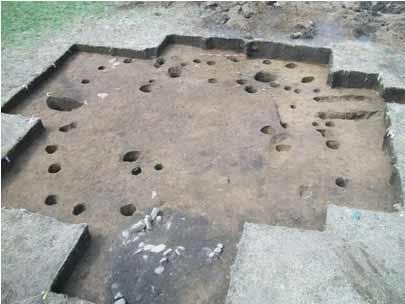A summer archeological field program at Great Smoky Mountains National Park offered more than science for a group of students from the Eastern Band of Cherokee Indians (EBCI)—it also allowed them to connect with their ancestral past.
At first glance, a description of the topics covered in the program is quite impressive: "Students participated in archeological excavations and were provided an opportunity to learn archeological field methods and regional culture history. Afternoon lectures in topics such as tribal, federal, State, and contract archeology, Cherokee archeology, geology, zoo-archeology, and plant ecology provide the students with a holistic view of the science of archeology, as well as job opportunities in archeology."
For this group of high schoolers, however, it wasn't just about science. The students, from the Cherokee and Snowbird communities, had a personal connection with the "dig" because they helped excavate a tenth century ancestral Cherokee house.
According to the archeologists supervising the project, "This site offered an opportunity to learn about a poorly understood period in Cherokee prehistory. Archeologists use the term Mississippian (AD 1000- 1350) to describe this period in prehistory. Populations during the Mississippian period moved to large scale agriculture with crops of corn, beans, and squash supplying a large portion of their diet. Mississippian populations concentrated around large ceremonial mound complexes. Social complexity, trade networks, communal cooperation and warfare all expanded during the Mississippian period."
The site involved in this project is old even by those standards. "Radiocarbon dates indicated that this structure occurs just prior to this period (AD 970 ±70 years). The site occurs on a small landform isolated from any known Mississippian mound center and could be considered to have occurred in a ‘rural’ setting. Therefore, it offered an opportunity to examine what is proto-Mississippian and what was life like somewhat distanced from people’s image of the mound builders in the Midwest and Southern Appalachians."
Discovery of the site resulted from much more recent activity in the area: it was identified in 2007 during excavations for a utility corridor that provided municipal water and sewer service to an NPS campground.
The field program helped the students learn what's involved in a modern scientific approach to literally uncovering the past. Program leaders noted, "Archeology is a destructive science and students learned proper recording techniques including mapping, archeological photography, and locational artifact information record keeping techniques."
What did they find during their hours of work under the hot summer sun?
Items discovered in the excavations included numerous ceramic vessel fragments, hickory and black walnut hulls, quartz and chert used for making stone tools, groundstone tool fragments for pulverizing and grinding plant materials, and a small gaming stone used in game of chance.
Features as well as objects were excavated, including storage pits and post holes (places where structural posts once were placed). Sediments from these features were retained for further analysis in the laboratory.
Discoveries from archeology don't end once items are out of the ground.
"Analysis of the materials is on- going and will culminate in a report in the following months. Analysis will include identifying potential patterns in the disposal of refuse across the structure, acquiring additional radiocarbon dates, identifying seed species to reconstruct the potential diets of the occupants, reconstructing ceramic vessels to determine uses and or functions of the vessels, identifying patterns in stone tool use, and cataloging all the collections for permanent retention."
Both the excavation and the detailed study of the artifacts and data require a lot of teamwork, and so did the funding which made this project possible. The program resulted from cooperative efforts of the EBCI’s Tribal Historic Preservation Office, the North Carolina State Historic Preservation Office, the University of Tennessee’s Archeological Research Laboratory, and the National Park Service. The Smoky Mountain Archeological Field program was supported through a Challenge Cost Grant.


 Support Essential Coverage of Essential Places
Support Essential Coverage of Essential Places






